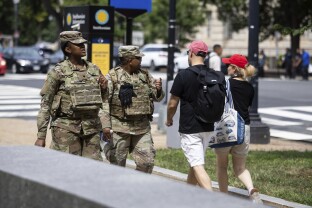Louisiana and Mississippi are the latest red states to comply with a request from the Trump administration to send hundreds more National Guard troops to Washington, D.C.
Louisiana is sending about 135 members of its National Guard to the District within 24 hours, Gov. Jeff Landry announced Monday. Mississippi announced earlier in the day it would contribute about 200 National Guard troops.
The move is an escalation of President Donald Trump’s federal incursion into Washington, D.C., after he took control of the city’s police department in an attempt to crack down on what he has argued is high levels of crime in the nation’s capital.
Republicans across the country quickly latched onto the message.
“We are a nation of law and order. Our capital is a reflection of our nation’s respect, beauty, and standards,” Landry said in a statement posted to X. “We cannot allow our cities to be overcome by violence and lawlessness. I am proud to support this mission to return safety and sanity to Washington DC and cities all across our country, including right here in Louisiana.”
“Crime is out of control there, and it’s clear something must be done to combat it,” Gov. Tate Reeves of Mississippi said in a Monday statement.
With the latest deployments, there are set to be nearly 1,800 National Guard members stationed on the streets of D.C.
Over the weekend, West Virginia said it was deploying 300 to 400 of its own Guard troops, while South Carolina pledged 200 and Ohio said it would contribute 150.
Last Monday, President Donald Trump announced he would be activating 800 D.C. National Guard members and taking control of the Metropolitan Police Department in order to address what he claims is a “crime emergency” in the city.
Throughout the week, military Humvees parked in front of Union Station and the Lincoln Memorial, while federal law enforcement officials fanned out throughout the District. The Department of Homeland Security has reported nearly 400 arrests over the last seven days.
In addition to arrests, law enforcement officials set up checkpoints along major roads where they made immigration arrests, cleared homeless encampments and tore down protest signs within neighborhoods.
Despite the administration’s rhetoric about crime in the nation’s capital, when Trump announced his state of emergency, local officials pointed to data released by the Department of Justice in January that found violent crime was at its lowest levels in more than 30 years.
“No emergency exists in D.C. that the president did not create himself, and he is not using the D.C. Police for federal purposes, as required by law,” D.C. Del. Eleanor Holmes Norton said in a statement on Friday.
Sign in
Log into your free account with your email. Don’t have one?
Check your email for a one-time code.
We sent a 4-digit code to . Enter the pin to confirm your account.
New code will be available in 1:00
Let’s try this again.
We encountered an error with the passcode sent to . Please reenter your email.



